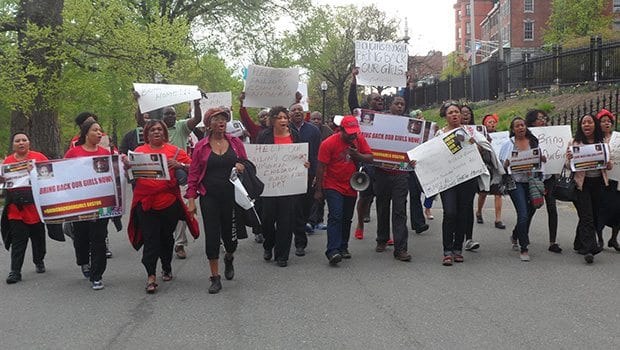
At the State House last Thursday, members of the Greater Boston Nigerian community and supporters marched on the Boston Common, demanding the return of the 200-plus boarding school girls abducted in Chibok, Borno state, Nigeria by the Islamic group Boko Haram.
More than two dozen men and women wore red shirts, chanted, and carried signs that read “Bring Back Our Girls” and “Boko Haram is a Threat to the World.” The marchers expressed frustration at what seems to be the inaction of the Nigerian Federal Government to save the missing children.
“The Nigerian government is making a mockery of itself internationally,” said Nigerian-American Nse Umoh Esema. Esema said he hopes that the rally efforts “put pressure on both the Nigerian and American governments to act and return those girls home safely.”
Boko Haram whose name means “Western education is evil,” rejects Western culture and has terrorized the Northern rural parts of Nigeria in its quest for a pure Islamic state based on a strict interpretation of Islamic law. In a video released last week, Islamic group leader Abubaker Shekau claimed responsibility for the abductions and referred to the girls as “slaves” and threatened to sell them in a marriage market.
Shekau released a video Monday purporting to show the school girls, three of whom spoke about converting to Islam. Shekau threatened to sell the girls as wives and said he would return them only if the Nigerian government releases Boko Haram fighters who are being held in prisons.
This week Nigerian leaders responded to international pressure to step up their efforts to find the kidnapped students, allowing U.S. military surveillance flights over Northern Nigeria to help track the insurgents.
Speakers at the Boston rally last week were critical of Nigeria for what many said was its slow response to the crisis.
“This should not be allowed in the 21st century,” said Muslim attorney Aminu Gawama.
Gawama who has visited Chibok and said Boko Haram’s usage of the religion of Islam has been misrepresented. “Please don’t allow anybody to use religion to divide you in this cause,” he told demonstrators both Muslim and Christian. “God can never approve what those extremists are doing,” he said.
Rally participants honored the kidnapped girls by reading aloud several names of the children, who were kidnapped from the boarding school on April 15. 180 names have since been released by a local organization in Nigeria according to the Los Angeles Times and ABC News.
On Tuesday of last week, there were reports that another 11 girls had been taken from villages in Wala and Warabe.
The tragedy created an outpour of protests and rallies worldwide. Social Media played a key role in the international pressure for swift action in searching for the missing students.
Boston resident Erica Barry heard about the rally through Facebook and wanted to support it.
“I don’t know very much about what’s going on in Nigeria, and I have learned a lot coming here. Social media brought me here, and it is a primary example of how powerful a tool it really is,” said Barry.
Darren Kew, associate professor of conflict resolution at the University of Massachusetts Boston said these girls are being used as “human shields” for a terrorist group that is growing into a “movement.”
“We don’t know where these girls are, but the world is watching the next moves the Nigerian government will take,” said Kew.
The rally was one of two last week to take place in front of the State House. Protestors also were out on Saturday.






